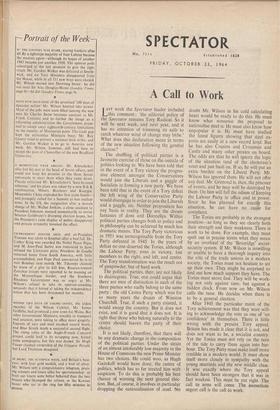A Call to Work
1 AST week the Spectator leader included this comment : 'the editorial policy of the Spectator remains Tory Radical. So it will be next week, and next year, and it has no intention of trimming its sails to catch whatever wind of change may bldw.' What does this declaration mean in terms of the new situation following the general election?
The shuffling of political parties is a favourite exercise of those on the outside of politics looking in. We have been told that in the event of a Tory victory the progres- sive element amongst the Conservatives would join the Liberals and a gaggle of Socialists in forming a new party. We have been told that in the event of a Tory defeat the left wing of the Conservative Party would disengage in order to join the Liberals and a gaggle, etc. Neither proposition has any basis in reality. They are the dream fantasies of dons and Donnellys. Within political parties changes both in policy and in philosophy can be achieved by much less dramatic means. The Tory Party victorious in 1951 was unrecognisable from the Tory Party defeated in 1945. In the years of defeat no one deserted the Tories, although the Labour Party, even in victory, lost members to the right, and left, and centre. The Tory transformation was the result not of gunpowder, but of hard work.
The political parties, then, are not likely to disintegrate. True, one could argue that there are men of distinction in each of the three parties who really belong to the same party : the old Centre Party which was for so many years the dream of Winston Churchill. True, if such a party existed, it would sweep the country. But it does not exist, and it is good that it does not. It. is right that those who belong naturally to the centre should leaven the party of their choice.
It is not likely, therefore, that there will be any dramatic change in the composition of the political parties. Under the strain of an almost intolerably low majority in the House of Commons the new Prime Minister has two choices. He could woo, as Hugh Gaitskell would have done, the centre of politics, which has so far treated him with suspicion. To do this is probably his best chance of winning the next general elec- tion. But, of course, it involves in particular dropping the nationalisation of steel. No doubt Mr. Wilson in his cold calculating heart would be ready to do this. He must know what nonsense the proposal to nationalise steel is. He must also know how unpopular it is. He must have studied the latest figures showing that steel ex- ports are easily at a new record level. But he has also Cousins and Crossman and Castle and many other pirates on .board. The odds are that he will ignore the logic of the situation (and of the electorate's vote) and just bash on. If so, he will put an extra burden on the Liberal Party. Mr. Wilson has ignored them. He will not offer any deal. Mr. Grimond is, then, the prisoner of events, and he may well be destroyed by them. On him will fall the odium of keeping the Labour Party in office and in power. Since he has• planned for exactly this situation, he can have no cattle for complaint.
The Tories are probably in the strongest position—as long as they see clearly both their strength and their weakness. There is work to be done. For example, they must spell out in precise terms what they mean by an overhaul of the 'Beveridge' social- security system. If Mr. Wilson is unwilling or unable to have a thorough inquiry into the role of the trade unions in a modern society, the Tories must not hesitate to set up their own. They might be surprised to find out how much support they have. The Tories must move fast. They will be work- ing not only against time, but against a hidden clock. From now on Mr. Wilson calls the tune. He decides when there is to be a general election.
After 1945 the particular merit of the Tory achievement was that they were will- ing to acknowledge the vote as one of 'no confidence' in themselves. There is little wrong with the present Tory appeal. Britain has made it clear that it is not, and does not want to be, a socialist country. Yet the Tories must not rely on the turn of the tide to carry them again into har- bour. The Tory Party must make itself more credible in a modern world. It must show itself more closely in sympathy with -the young marrieds and the new middle class. It was exactly where the Tory appeal should have been strongest that it was in fact weakest. This must be put right. The. °call to arms will come. The immediate urgent call is the call to work.


































 Previous page
Previous page